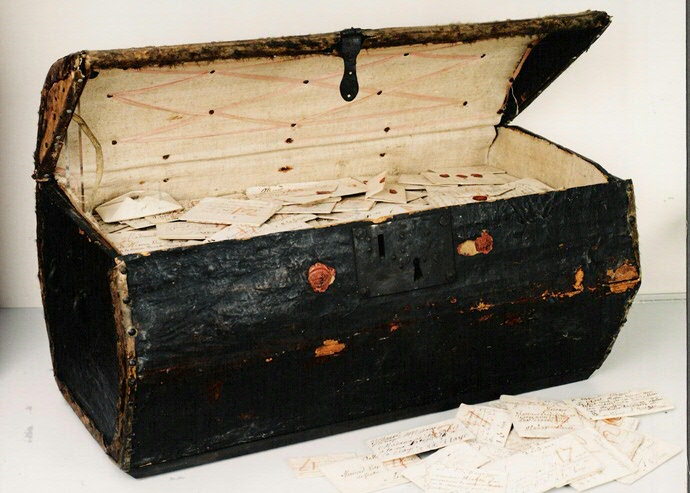17th-CENTURY LETTERS FINALLY REVEAL THEIR SECRETS

The archive of a 17th-century postmaster has been rediscovered in the Museum f or Communicati on in The Hague . A chest on the premises contains 2,600 undelivered letters, 600 of which are still sealed . Thanks to new scanning techniques, an international research team Signed, Sealed & Undelivered , led by D r David van der Linden ( University of Groningen) and D r Nadine Akkerman ( Leiden Universit y / NIAS), will soon be able to reveal the secrets of this archive .
The letters, most of which were posted in France, were stored by The Hague-based postmaster, Simon de Brienne, and his wife, Maria Germain. The Briennes held onto letters that were undeliverable because the addressee had moved, died or simply refused to accept them, in the hope that the addressees would eventually come by and collect them. These letters now represent a treasure trove, untouched by time: 2,600 letters, brimming with gossip, scandal and intrigue.

The letters were folded and sealed
Researchers from Leiden University, the University of Groningen, The University of Oxford, Yale University and MIT will be first to read and analyse the letters. They will not only take note of the content of the correspondence, but also the way that the letters were folded and sealed.
The sealed letters will not be opened. Thanks to X-ray computed tomography, an advanced scanning technique which was also used to study the Dead Sea Scrolls, the letters can be read without breaking the seals, leaving the material evidence of letter sealing untouched.
Unique collection
But the thing that makes this collection particularly unique is the fact that the letters do not need to be unfolded. Van der Linden: ‘People had a very personal way of folding letters, rather like their own signature. We call this “letter locking”: folding and sealing a letter so that nobody could secretly read it. This is a revolutionary new research field – and the letters in this collection form a golden opportunity to study and analyse these different styles of folding.’
Letters of ordinary people
The letters will also shed light on the life and times of ordinary people from the past, particularly Huguenot families forced to flee their homes. Van der Linden: ‘A lot of Huguenots fled religious persecution under Louis XIV, while others remained in France. Letters were their only way of staying in touch. The letters in this collection show the high emotional price that these families had to pay for separation.’
Research team
The research team comprises Dr David van der Linden (University of Groningen), Dr Nadine
Akkerman (Leiden University / NIAS), Koos Havelaar (Museum for Communication), Jana
Dambrogio (MIT Libraries), Dr Rebekah Ahrendt (Yale University) and Dr Daniel Starza Smith
(Lincoln College, Oxford).
The project is funded by the Netherlands Organisation for Scientific Research (NWO)
through Alfa Meerwaarde
, and
MIT Libraries
(United States).
More information
Project website: www.brienne.org
Twitter: #signedsealedundelivered
More high-resolution images are available on: http://muscom.pr.co/ and http://www.muscom.nl/nieuws/
Contact details
David van der Linden
d.c.van.der.linden rug.nl
More news
-
19 January 2026
Digitization can leave disadvantaged citizens in the lurch
-
13 January 2026
Doing good in complex situations
